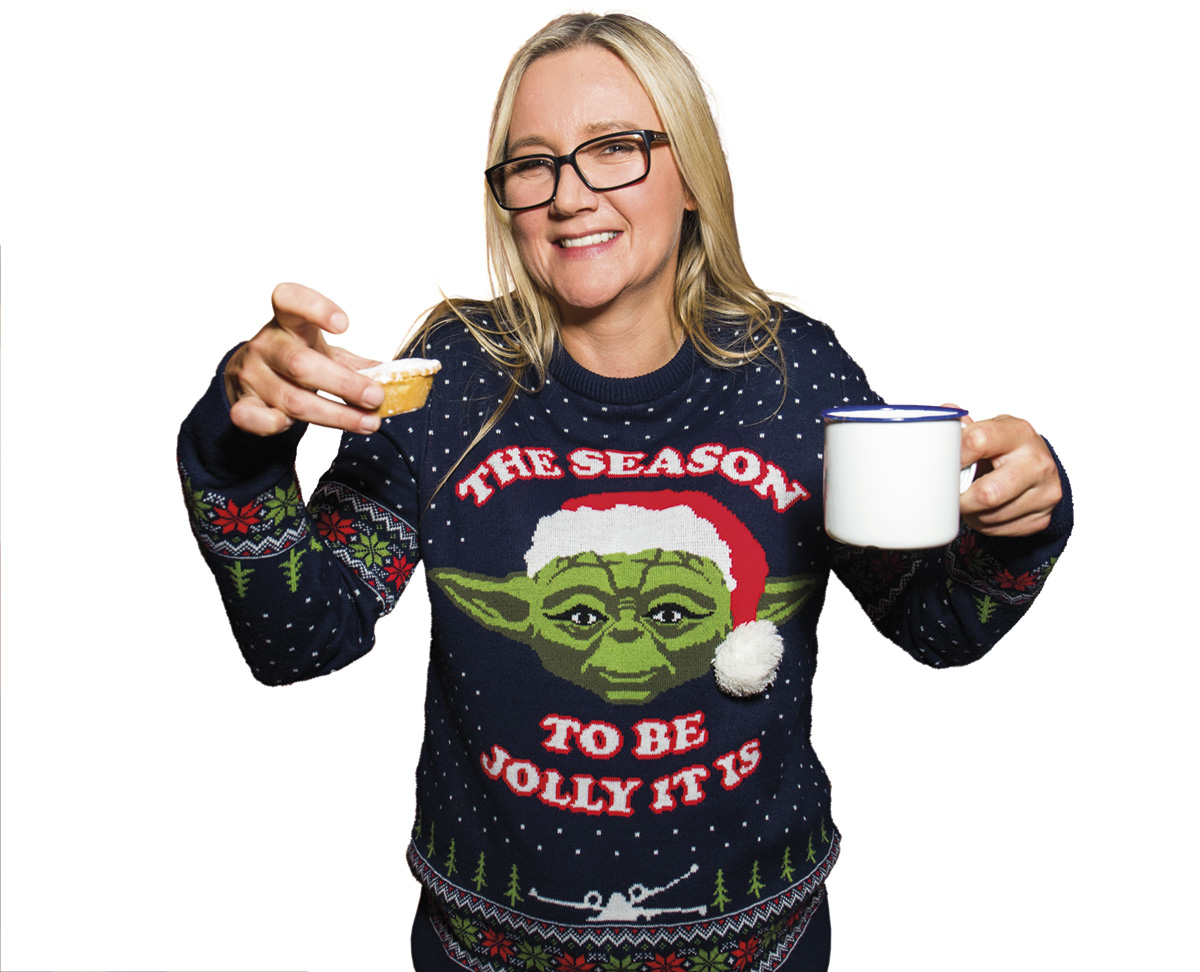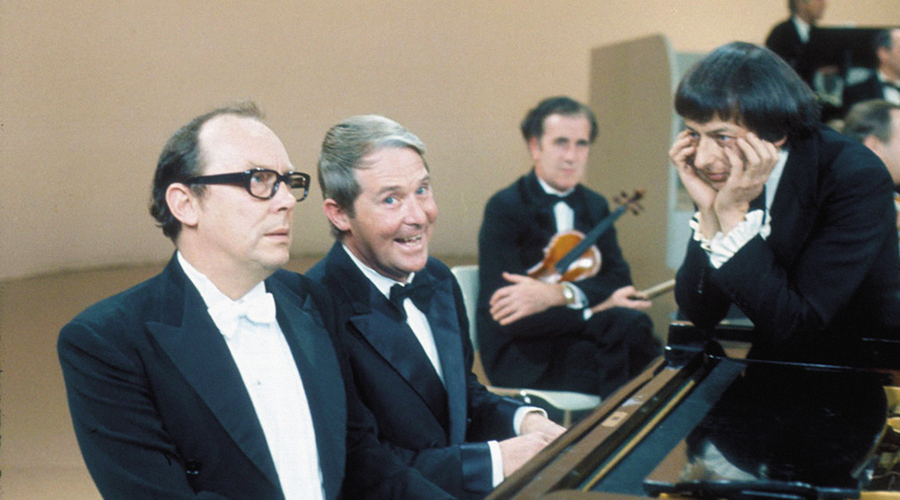Matthew Bell is haunted by the ghosts of Morecambe and Wise at a Yuletide RTS event.
Christmas ratings are not what they used to be. Many think that festive television is trading on past glories. Now it is threatened by streaming. When bingeing on box sets is more common than keeping up with the latest from the soaps, can Christmas telly survive?
In December, an RTS early-evening event summoned up the ghosts of Christmas TV past, present and future to look back at festive classics, discuss the 2018 Christmas schedules and predict the role TV will have – if any – in Christmases to come.
Over nearly four decades, Michael, now Lord, Grade walked the corridors of power at London Weekend Television, the BBC, Channel 4 and ITV. He was director of programmes at LWT; controller of BBC One and, later, the corporation’s Chairman; Chief Executive of Channel 4; Chief Executive and Executive Chairman of ITV.
No one is more qualified to discuss festive TV. He brought with him a bumper box of clips from past Christmas specials, including EastEnders, Upstairs, Downstairs and, of course, The Morecambe & Wise Show, in which Eric Morecambe played “all the right notes but not necessarily in the right order” with the composer André Previn.
Eric and Ernie’s specials remain the British public’s most memorable Christmas show, according to a BBC poll – even though their final festive special, by which time the duo had switched to ITV, was shown on Boxing Day in 1983.
Lord Grade commissioned many of the nation’s favourite festive programmes, including the 1986 Christmas Day EastEnders in which Den issued Angie with divorce papers.
Soaps are a key part of the festive schedules. “They’re familiar and the audience knows that something dramatic is going to happen on Christmas Day.
Everyone will be at everyone’s throats, trying to kill each other – just like at home,” said Lord Grade.
“The secret of Christmas shows is that you’ve got to have a sense of anticipation,” he continued. “You can’t have a run-of-the-mill episode.”
The BBC dominated the festive ratings during Lord Grade’s era – and it still does. He offered a simple explanation for ITV’s poor performance: “We never bothered. We didn’t want to give away our crown jewels over a holiday period when there was no advertising revenue.
“We used to get murdered by the BBC, which we didn’t care about because there was no revenue,” he continued. “We let the BBC have it.”
There is far more at stake for the corporation at Christmas. “For the BBC, it is crucially important because it’s the time when the BBC can prove to the nation that it has something for everyone,” he argued.

As Chief Executive at Channel 4 for almost a decade from 1988, the great scheduler adopted a different approach to the Christmas schedules.
The problem was, he recalled, “What the hell do you do at Christmas? All we could do was make trouble and try to do something that was outrageous.”
In 1993, Lord Grade introduced the Alternative Christmas Message, which was delivered by Quentin Crisp. At the RTS event, he showed a clip of Brigitte Bardot’s 1995 Message.
The ghost of Christmas present – BBC entertainment controller Kate Phillips – argued that festive TV should be “shared viewing”.
In entertainment, she said, “I want shows that the three Gs will watch – [when] three generations come together, grandparents, parents and children. That’s a really hard thing to do but, at Christmas, the BBC does it really well and has done so historically.”
Among the festive favourites filling the BBC’s 2018 schedules were Call the Midwife, Mrs Brown’s Boys and Strictly Come Dancing, the three highest-rating shows last Christmas. “It’s the familiar titles but they’re all a bit special on Christmas Day, which is what people want,” said Phillips.
She added that her role was to “keep the greats great and grow the new greats. It’s a tricky balance, because we have so many titles in entertainment that are still performing well.”
Lord Grade revealed that, when Strictly Come Dancing was first commissioned, Bruce Forsyth thought that the “show would be taking the piss out of the celebrities, which is what attracted him” to hosting the series. “He had no idea they were going to take it so seriously and be so good.”
Winning promotion in 2018, from Christmas Eve to Christmas Day, was Michael McIntyre’s Big Christmas Show. “Morecambe & Wise was brilliant but Michael McIntyre is that modern, multi-strand variety show and I think he does it brilliantly,” said Phillips.
The ghost of Christmas yet to come – Kate Russell, one of the presenters of the BBC’s consumer technology programme Click – offered an imagined story of a family Christmas with technology to the fore.
In Russell’s vision of the future, the Queen gave her annual Christmas address in “holographic form” in the family’s living room; artificial intelligence selected comedy sketches on the TV; and virtual assistant Alexa ordered pizzas, which were delivered by a drone to the family – who were still watching TV, in the traditional manner, huddled on the sofa.
Much of the technology mentioned in her story is “in existence now”, said Russell.
“It was [the author] William Gibson who said: ‘The future is already here; it’s just not widely distributed yet."
Russell demonstrated to the audience an augmented-reality app that offered a visual lesson in how to carve a Christmas turkey. “We have this technology – it’s just a question of it becoming mainstream and affordable,” she said.
“Viewing habits are changing – people are watching live streaming, people want to be part of the broadcast and not passively experiencing [it],” argued Russell.
“But I hope we’ll still get together on Christmas Day and watch the old films as a family,” she continued.
“My take on it is that audiences in 100 years’ time will still have an appetite for stories, laughter and emotion – all the things that television can provide,” said Lord Grade. “All that’s changing is the distribution methods – the way you get it.”
“Look at the amazing explosion of box-set drama,” he suggested – it reflects “our hunger for stories”.
Christmas 1936
The BBC’s first Christmas Day television in 1936 – broadcast from Alexandra Palace, London, to just 400 households – offered an eclectic mix of programmes.
But, from the earliest days of TV, schedulers recognised that Christmas deserved festive-themed shows.
The Christmas Turkey: A Demonstration of Carving was the first programme of the day at 3pm, ingeniously scheduled in a post-lunch slot to demonstrate to viewers, presumably, how they should have carved their turkeys.
News Reel followed and then a talk, A Lonely Christmas in the Arctic; succeeded by the first Christmas special of magazine show Picture Page; Christmas Carols: The Singing Boys; A Seasonal Tour Through the Empire; Some Unusual Christmases; more News Reel; and the final programme of the day, Television Party, before television closed down at 10pm.
In total, the BBC was on air for just one hour in the afternoon and one in the late evening. It was a small beginning but it marked the beginning of Christmas TV.
BBC rules the festive season ratings
Contrary to popular belief, EastEnders, shown in two separate parts on Christmas Day 1986, is not Christmas Day’s most popular programme. The soap pulled in 30.2 million viewers; but this figure combines viewers who watched on 25 December and separate audiences for the omnibus edition on 28 December.
In reality, the honour goes to the Paul Hogan movie Crocodile Dundee, which secured 21.8 million viewers for BBC One on Christmas Day 1989.
Following closely behind, is the 1977 Christmas outing of The Mike Yarwood Show (21.4 million), which featured a bizarre sketch with then-Chancellor Denis Healey dressed as a punk (impersonated by Yarwood) and Paul McCartney (the real Macca).
For the Christmas period as a whole, Only Fools and Horses takes the honours, clocking up 24.4 million viewers for a single show on 29 December 1996.
Christmas Day TV ratings in 2017 were the lowest since reliable records began: the top show was Call the Midwife, which visited South Africa for its festive outing, with a consolidated audience of 9.2 million.
The runner-up was BBC sitcom Mrs Brown’s Boys (9 million). The only ITV shows in the top 10 – a Christmas tradition that endures – were the veteran soaps Coronation Street and Emmerdale.
BBC entertainment controller Kate Phillips, however, was optimistic about the future. ‘I refuse to believe that ratings are going to keep falling each year. On Christmas Day, people do want to come together.”
Consolidated ratings, which include non-live viewing within seven days of a programme’s transmission, ‘are becoming much more important now’, she added.
Lord Grade, though, was dismissive about the importance of ratings, especially if they were used to influence creative decisions. ‘I hate anything that leads you towards reading audience’s reactions to last night’s TV and making judgements about what you’re going to commission on the basis of what the audience watched,’ he said. ‘It is the broadcasters’ job to keep ahead of public taste.
‘I’m always nervous about anything to do with data that points you towards some kind of predictable, formulaic [programming].’
Modern comedy at Christmas
Lord Grade: ‘In the tradition of Eric and Ernie, Peter Kay – he’s got different skills, of course – is the supreme artist, who has the widest possible appeal.
‘His material, as far as I’ve ever seen, is very clean and family-oriented. He’s clever, he’s funny, he’s a natural clown, [and] he’s a brilliant actor and writer. Car Share was so original and brilliant.’
Kate Phillips: ‘In Car Share he got away with a whole [routine] about dogging.… Mrs Brown’s Boys sails pretty close to the wind [too] – [Brendan O’Carroll] gets away with murder and people love it.… I’d rather do stuff that people are talking about.’
Lord Grade: ‘Mrs Brown’s Boys is a radical show in breaking the fourth wall, which is quite revolutionary in comedy, [although] it’s a traditional, Carry On-type sitcom.’
Kate Phillips: ‘Brendan O’Carroll is a brilliant man. What works very cleverly on that show is that it’s quite rude [with lots of] slapstick, but then he does this moving epilogue when he talks about family.
‘It’s going right back to those brilliant Only Fools and Horses episodes where you had all the slapstick but there was also stuff that got you [in the heart].’
The RTS early-evening event ‘A TV Christmas Carol’ was held at The Hospital Club in central London on 6 December. The event was chaired by Anita Singh, arts and entertainment editor of the Daily Telegraph, and produced by Andrew Scadding and Sue Robertson.







